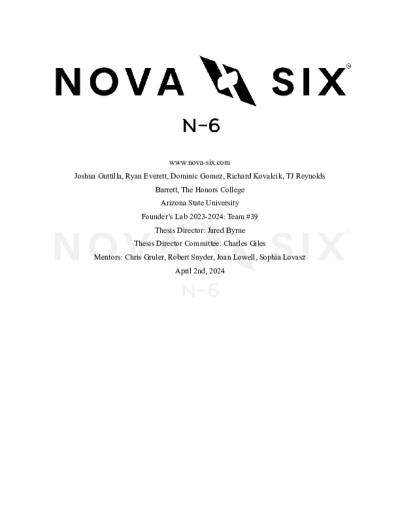Filtering by
- Creators: Barrett, The Honors College
- Resource Type: Text

This project examines entry-level processors for Company X. Analyzing their current position and creating recommendations for their future positioning in regard to entry-level processors. Utilizing financial models, our group worked to determine the most effective way to optimize NPV and gross margin for this segment. With extensive step models and sensitivity analysis, we analyzed potential paths that Company X could take. Continuing to be mindful of the limitations that certain projected paths would entail. Through our analysis, we were able to form a comprehensive suggestion that had a positive 8-year NPV and an improved gross margin percentage.


In Ritual and Religion in the Making of Humanity, Roy Rappaport misses an opportunity to more tightly theorize the synergistic relationship between concepts of the divine, the psyches of ritual participants, and the adaptive dynamics of religious sociality. This paper proposes such a theory by drawing on implicit features of Rappaport’s account, fulfilling his goal of a “cybernetics of the holy.” I argue that concepts of the divine, when made authoritative for participants through ritual, have three important effects: they invite intense and meaningful reconstructions of personal identity according to paradigmatic examples; they act as a form of encoded social memory by organizing human relationship according to a “spiritual map”; and they provide the cognitive framework that make religious community organization robust, adaptive, and reproductive. We can characterize divine concepts as “specified absences” that ground each of these effects and link them together in a mutually-reinforcing set.

The conscientious are morally conflicted when their moral dilemmas or incommensurabilities, real or apparent, have not been resolved. But such doublemindedness need not lead to ethical disintegration or moral insensitivity. For one may develop the moral virtue of doublemindedness, the settled power to deliberate and act well while morally conflicted. Such action will be accompanied by both moral loss (perhaps 'dirty hands') and ethical gain (salubrious agental stability). In explaining the virtue's moral psychology I show, among other things, its consistency with wholeheartedness and the unity of the virtues. To broaden its claim to recognition, I show the virtue's consistency with diverse models of practical reason. In conclusion, Michael Walzer's interpretation of Hamlet's attitude toward Gertrude exemplifies this virtue in a fragmentary but nonetheless praiseworthy form.

Rice is an essential crop in Ghana. Several aspects of rice have been studied to increase its production; however, the environmental aspects, including impact on climate change, have not been studied well. There is therefore a gap in knowledge, and hence the need for continuous research. By accessing academic portals, such as Springer Open, InTech Open, Elsevier, and the Kwame Nkrumah University of Science and Technology’s offline campus library, 61 academic publications including peer reviewed journals, books, working papers, reports, etc. were critically reviewed. It was found that there is a lack of data on how paddy rice production systems affect greenhouse gas (GHG) emissions, particularly emissions estimation, geographical location, and crops. Regarding GHG emission estimation, the review identified the use of emission factors calibrated using temperate conditions which do not suit tropical conditions. On location, most research on rice GHG emissions have been carried out in Asia with little input from Africa. In regard to crops, there is paucity of in-situ emissions data from paddy fields in Ghana. Drawing on the review, a conceptual framework is developed using Ghana as reference point to guide the discussion on fertilizer application, water management rice cultivars, and soil for future development of adaptation strategies for rice emission reduction.

Transdisciplinary research practice has become a core element of global sustainability science. Transdisciplinary research brings with it an expectation that people with different backgrounds and interests will learn together through collective problem solving and innovation. Here we introduce the concept of “transdisciplinary communities of practice, ” and draw on both situated learning theory and transdisciplinary practice to identify three key lessons for people working in, managing, or funding such groups. (1) Opportunities need to be purposefully created for outsiders to observe activities in the core group. (2) Communities of practice cannot be artificially created, but they can be nurtured. (3) Power matters in transdisciplinary communities of practice. These insights challenge thinking about how groups of people come together in pursuit of transdisciplinary outcomes, and call for greater attention to be paid to the social processes of learning that are at the heart of our aspirations for global sustainability science.

Foodways have been a component of archaeological research for decades. However, cooking and food preparation, as specific acts that could reveal social information about life beyond the kitchen, only became a focus of archaeological inquiry more recently. A review of the literature on cooking and food preparation reveals a shift from previous studies on subsistence strategies, consumption, and feasting. The new research is different because of the social questions that are asked, the change in focus to preparation and production rather than consumption, and the interest in highlighting marginalized people and their daily experiences. The theoretical perspectives the literature addresses revolve around practice, agency, and gender. As a result, this new focus of archaeological research on cooking and preparing food is grounded in anthropology.